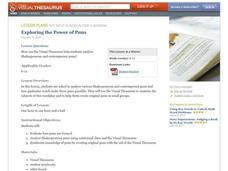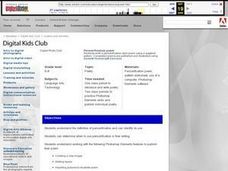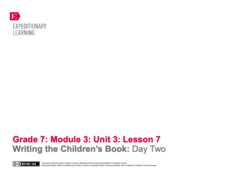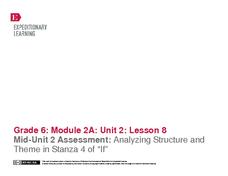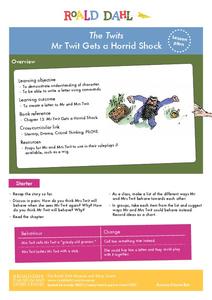Curated OER
Edward Lear, Limericks, and Nonsense
Introduce your class to the delights of nonsense poetry and explore literary devices with the writing of Edward Lear. Learners identify rhyme and meter as well as figures of speech, alliteration, and onomatopoeia in "The Owl and the...
Curated OER
What Makes Jokes Funny?
Explore how language is used for comic effect. Middle schoolers determine which of the three formulas for jokes (double meanings, unexpected outcome, humorous mental image) make each of 18 classic, corny examples funny. They complete a...
Curated OER
Exploring the Power of Puns
Read and analyze a variety of Shakespearean and contemporary puns using Visual Thesaurus computer software. Middle and high schoolers analyze a pun as a class; in small groups they analyze a Shakespearean pun using contextual clues and...
Curated OER
Let's Focus on Idioms
Get online and explore idioms. Your class will use the Internet to locate, choose, and illustrate their favorite idioms. They make a class PowerPoint with illustrations for their idioms and explain the meaning of each. A great way to...
Curated OER
Irony in "The Gift of the Magi"
Use O. Henry's ubiquitous tale of love and poverty to explore irony. After reading the story, middle schoolers identify examples of all three kinds of irony in the story. With partners, they brainstorm original examples of irony. Then...
Curated OER
Revision
Young poets learn the value of using a thesaurus when crafting and revising poems. They examine poems rich in figurative language and then a revised version with the figurative language removed. To demonstrate what they have learned,...
EngageNY
Poetic Tools in Narrative of the Life of Frederick Douglass
Scholars listen to a reading and answer probing questions about If We Must Die by Claude McKay. Readers annotate their personal copies of the poem as they discuss its figurative language, vocabulary, and meaning. They then transfer their...
Curated OER
Vivid Verbs
Spice up your writing! Your amateur writers will benefit from concentrating on understanding and improving verb use in writing. An introductory activity addresses weak verbs. A second exercise helps them see the importance of strong...
Curated OER
Personification Poem
Students write a personification poem and identify its use. They make a pattern worksheet and then use Photoshop Elements skills to illustrate their poem. Students use layer styles with the text to highlight the poetry.
Curated OER
A Seashell Lesson: Writing for Detail and the Scientific Process
Practice descriptive language in this lesson, which prompts elementary and middle schoolers to write detailed descriptive sentences describing a seashell. They write a description of a shell, create an illustration, and other students...
Curated OER
Understanding and Using Suffixes to Expand Vocabulary
After a review of what suffixes are and how they are used, middle schoolers utilize a worksheet that is embedded in the plan to work in pairs to strengthen their understanding and skills in using these very important parts of our...
Poetry4kids
Onomatopoeia Poetry Lesson Plan
Two exercises boost scholars' knowledge of a onomatopoeia with excerpts from famous poems. In exercise one, participants circle onomatopoeia words. Exercise two challenges writers to choose three words to use in an original poem.
Curated OER
Horse Character: Ceramics Lesson
Animals oftentimes elicit various characteristics which make them symbolic or representative of human feeling, action, or emotion. The class creates horse characters out of clay to show character action and symbolism. This is a great...
Penguin Books
An Educator’s Guide to Savvy by Ingrid Law
Literature circles give learners a chance to explore a novel in a unique way. An educator's guide for the book Savvy uses literature circles as part of the novel study. Additional activities cover elements of figurative language and...
Curated OER
Genre Lesson: Poetry
Hook kids into a study on poetry elements by asking them to bring in the lyrics to their favorite song. Discuss the elements in one or two songs (preferably that demonstrate rhyme, figurative language, or a repeating phrase). Groups do...
Curated OER
Snowy Similes
The class defines similes after creating a KWL chart about them. Groups rotate through a series of stations in which they creatively complete similes. They create a picture booklet that contains similes. However, the booklet topic and...
Curated OER
Lesson Plan: Sensory Exploration
Using their keen eyes and ears, learners build story observation skills which they will use to create sensory detail in their art. They note all of the things they observed on a walk, categorize them by sense, and then use the same skill...
Curated OER
Poetry Beyond Words
Participate in writing poetry as a group. Focused on a given theme, young writers compose a popcorn poem using sensing verbs and adverbs. They write popcorn poems, onomatopoeias, collective poems, and diamond poems. You could introduce...
Curated OER
Political Cartoons: Literacy
Readers decode and deconstruct political cartoons to heighten critical thinking, extra-textual literacy, and making meaning from symbolism and metaphor. A compatible activity to use in English class when your 8th or 11th graders are...
EngageNY
Writing the Children’s Book: Day Two
Following a brief mini-lesson on using dialogue in fiction, young writers continue day two of their writing workshop. They work on the second half of their Children's Book Storyboards, and then they turn and talk with partners to reflect...
Curated OER
I Have a Metaphor
Learners locate the literary devices used in Martin Luther King Jr.'s "I Have a Dream" speech. For this figurative language lesson plan, young scholars first distinguish between similes, metaphors, analogies, personification, etc....
Carolina K-12
What Is the American Dream?
How do you describe the American Dream? What motivates others to immigrate to the United States, and why do some groups have trouble attaining the American Dream? Your learners will consider these questions as they explore figurative...
EngageNY
Analyzing Structure and Theme in Stanza 4 of “If”
Here is a lesson that provides scholars with two opportunities to stretch their compare-and-contrast muscles. First, learners compare and contrast their experience reading the fourth stanza of If by Rudyard Kipling to listening to the...
Roald Dahl
The Twits - Mr Twit Gets a Horrid Shock
Mr. and Mrs. Twit do not treat each other very nicely. The sixth lesson plan in an 11-part unit designed to accompany The Twits by Roald Dahl explores the way the characters talk to and treat one another. Role play and writing activities...




